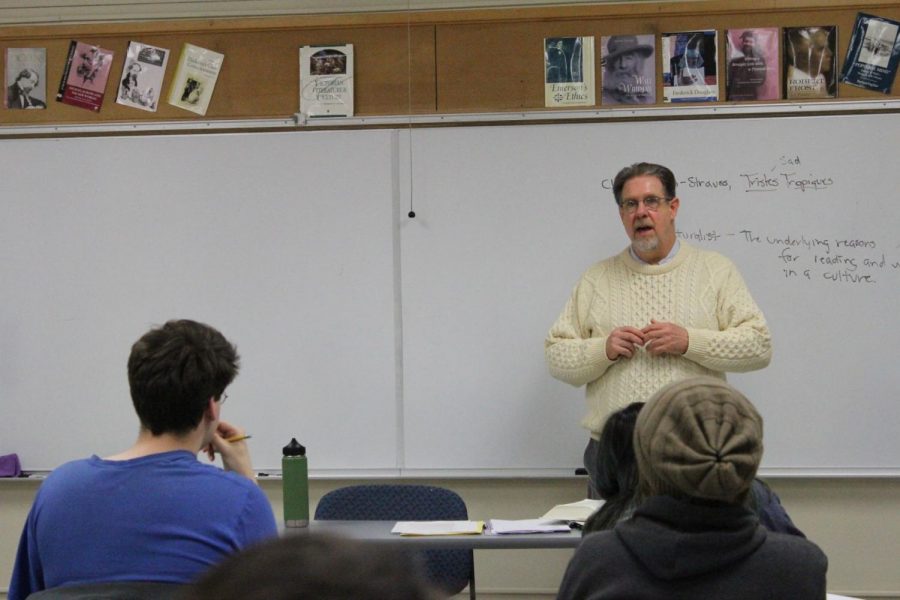David Weed first to earn senior lecturer position
March 12, 2018
When there’s a lot of grading to do, David Weed is known to work 12 to 14 hours a day.
Weed is a senior English lecturer at Washburn who teaches Freshman Composition and Literary Criticism and Theory. Weed is the first faculty member in the English department to earn the title of senior lecturer after teaching at Washburn for more than 20 years.
He is also a published scholar who has produced peer-reviewed journal articles both in his specialized fields of literature and composition.
Weed often uses the topic of advertising in his assignments. He has students analyze the way advertisements present gender roles. Weed found that students catch on and understand it after some introductory work.
“Information can be important, but you have to be able to know what to do with the information,” said Weed. “I try to help students learn how to work with information, rather than just know things, help their critical thinking skills, [and to] pay attention to their own processes of thinking.”
Weed believes his students will be successful if they engage with the material and with their peers. He values the ability to learn.
“[Weed is] very easy going, very willing to let others lead the discussion in the class,” said Andrew Foster, a junior philosophy major, who is taking the Literary Criticism and Theory class. “If we started to really dig into a topic, he is more than willing to let the students express their ideas. It’s a kind of learning style that I really like. It allows and encourages people to be excited about what it is they are learning about. The best part of class is that it’s well-paced so that people are able to process the information, start to get a hold of it. It allows people to have a much bigger understanding of the topics themselves.”
Weed tries to keep his students engaged and excited to learn new things.
“I try to find material that is interesting and present [it] in an interesting way because I know it’s helpful,” Weed said.
Weed showed an Edward Hopper painting in class, called “Automat” and had students look carefully at the painting, the themes that are going on within it and the various meanings of its elements.
“A lot of students haven’t necessarily done that kind of work,” said Weed. “So we spent most of the period looking and reading and understanding one painting … that’s the nice thing about using art for critical thinking or literature. It doesn’t necessarily just have one meaning, it’s got multiple possibilities.”
Weed is always looking for new ways to ensure his students succeed.
“I’m trying to help students trust themselves, ‘cause a lot of times they’re afraid that they might be wrong,” Weed said. “I try to let them know that it’s not really a matter [of] being right or wrong. It’s a matter of trying out different arguments and ideas. My classes are about learning how to figure things out.”
Vanessa Steinroetter, chair of the English department, said Weed regularly challenges himself to revise and improve courses he has taught before to keep both himself and his students interested and engaged. Steinroetter says he has distinguished himself by his willingness to innovate and to pioneer new courses and initiatives in the English department.
“Dr. Weed was one of the first English faculty to embrace online teaching at Washburn,” Steinroetter said. “He was also among the first instructors in the English department to pilot courses in developmental writing aimed at preparing students in need of additional writing practice for EN 101 First-Year Writing. Weed has also designed a number of new courses for the English department over the years, and in the Fall 2018 semester, for instance, he and [history professor] Tom Prasch will be teaching another new course titled Envisioning the Future.”
Eric McHenry, fellow English professor had high praise for his colleague, Weed.
“He is smart but humble, sensible, impressively learned, dryly funny and deeply invested in helping students,” said McHenry.



